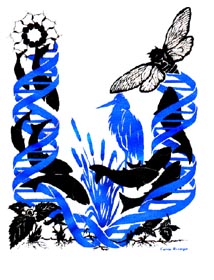
- Examining the effects of stress on innate immunity. We've used fish as models and are presently using some blood samples from veterinary clinics where students work.
- Expression of the hsp70 protein and mRNA in different environments.
- Microbial diversity in melaleuca invaded and pristine forests using molecular biology tools (RISA).
- Population dynamics of gopher tortoise (G. polyphemus) in local public and private mitigation and preserve areas.
- Other Areas of Potential Collaboration
-
-
fostering independent student research
-
innate immunology (emphasis on innate)
-
fish and shellfish disease
-
| Research
Interests:
How do stressors affect innate immunity? In an effort to merge my expertise as a comparative immunologist with the environmental emphasis of this University, I am interested in research and collaborations that evaluate the immunological capacity of organisms in pristine and polluted sites. Of particular interest are invasive and endangered species of SW Florida. In the fall of 2005, my Immunology students and I are examining the activity of plasma lysozyme in pets, fish, oysters, clams and humans. Are the levels in mammals higher or lower than in invertebrates? How much does freezing and dilution affect the assay? Hw critical is the buffer to the activity level? During the summer of 2004 I examined the level of Heat shock 70 protein levels in oysters (Crassostrea virginica). We wanted to see if the level of hsp70 is up-regulated in areas that we suspect are heavily polluted or in areas where the oysters are subject to an acute stressor such as an an extreme inflow of freshwater. These studies were inconclusive, and will be addressed again as micro-arrays for oysters become widely available. I recently completed a study on the effects of acute stress on the innate immune response in the blue tilapia (Oreochromis aureus). This included the activity of plasma lysozyme. The acute time-scale examined was ten minutes, less time than needed to initiate transcription of new genes. The work was being done with the assistance of the Lee County Hyacinth Control District, who housed the fish. My graduate research focused on the effects of acute stress on innate immunity. We proposed that as a result of the fight or flight response an organism would have increases in plasma proteins that would help them identify and destroy foreign and damaged materials. We found increases in the concentrations of 4 plasma proteins within 10 minutes of an acute handling stressor. The concentration of two of these proteins had returned to the original level by 20 minutes after the initiation of stress. One of the identified proteins is Complement component C3 which helps identify and destroy bacteria and viruses. I am willing to discuss and participate in almost any biological research. |
|
Opportunities for Student Research:
I have mentored Biology students here at FGCU whose independent projects ranged from microbial diversity to sea turtle nesting sites, ADHD, L.A.S.I.K. surgery, incidence and study of violence in rape cases, and animal models for Muscular Dystrophy research. |
Do not reproduce without permission.
